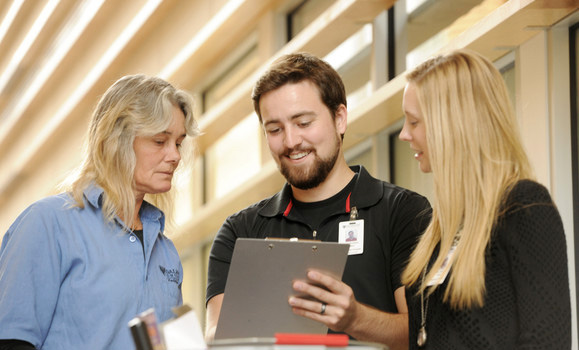Some of them are the first to arrive on campus each morning. Others are the last to leave at night.
‚ÄúThey are the unsung heroes of this campus,‚ÄĚ says Tanya Packer, director of the School of Occupational Therapy. ‚ÄúThey are a hugely important part of the Dal community, dedicated to making our campuses a better place for the rest of us.‚ÄĚ
She's referring to Dal's Custodial Services staff, a team of 180 across the university's four campuses. Some are just starting their careers; some are nearing retirement. The daily tasks they face in keeping campus clean and safe are demanding and, in recent years, injury rates have begun to climb.
This was a growing concern for Michael Campbell, custodial services manager. ‚ÄúI wanted my folks going home the same way they were coming in,‚ÄĚ he says.
Many organizations looking to improve safety in the workplace have an external occupational therapy service come in, analyze and improve the situation but often at large cost. Last August, Campbell wanted to see if he could tap into resources already available on campus, and after connecting with Janice MacInnis in Human Resources for ideas, reached out to the School of Occupational Therapy.
Őż
‚ÄúFrom the onset, I saw this as a win-win,‚ÄĚ says Dr. Packer. ‚ÄúThe custodians could help our students learn what they needed to learn, while our students could contribute to the health and safety of the custodians.‚ÄĚ
Putting plans into action
The first phase of the plan gave 60 Occupational Therapy students the opportunity to shadow 30 custodians as they went about their daily duties. They learned from the custodians what these tasks involved, collecting data for the second phase.
The second phase began in May with the work placement of two first-year students working towards their Master of Science in Occupational Therapy degrees: Lisa Chisholm and Derek Thompson. This wasn't your typical placement: according to Dr. Packer, most students work directly with practicing occupational therapists for their three-work terms. Only about 8-10 per cent of placements are at an offsite model like the one Lisa and Derek worked on (without direct supervision) and two-thirds of all placements are typically second-year students. Őż
But, with the support of Dr. Packer, faculty members and Karen Joudrey, a full-time practitioner and part-time tutor with the School of Occupational Therapy, Lisa and Derek were able to learn a huge amount from the project.
‚ÄúWe realised we knew a lot more than we thought we did,‚ÄĚ says Lisa. ‚ÄúWe learn theories in a classroom and we can recite them, but when you're actually working with someone in real life, it's a whole new experience.‚ÄĚ

Over their two-month placement, Lisa and Derek worked directly with a team of custodians to find safer practices for completing daily tasks. They held information sessions regarding the two most common problems (lower back issues and repetitive strain injuries) where custodians problem-solved scenarios, such as how best to lift a heavy bucket of water in a small space.
‚ÄúIt was a great opportunity to cement the things we had learned,‚ÄĚ says Derek. ‚ÄúThe theories really sunk in once we put them into practice.‚ÄĚ
An all-around success
Derek and Lisa weren't the only ones happy with the outcome. Although it is too soon to collect statistical evidence of the project's success, Campbell was pleased to see how eager custodians were to participate. ‚ÄúPlus, we were able to do things internally, using the expertise already here in the Dal community,‚ÄĚ he says.
There are already plans to begin another round of the initiative, expanding it to all teams within Custodial Services. The project will address the strenuous tasks involved in keeping the campus clean through the winter and then, come April, the demands of the residences in transitioning to summer accommodations. This will give even more Occupational Therapy students the chance to benefit from the ‚Äúreal life‚ÄĚ learning opportunities provided by the Dal custodians.
‚ÄúThis is exactly what a university should be doing: using our own knowledge and research to better our environment and look after our community,‚ÄĚ says Dr. Packer.

